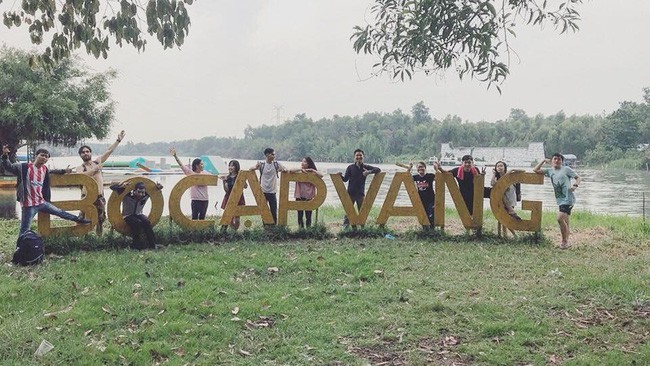
Dong Nai province, one of the most dynamic areas in southern Vietnam, has a huge potential for tourism development, particularly eco-tourism.
Dong Nai province, one of the most dynamic areas in southern Vietnam, has a huge potential for tourism development, particularly eco-tourism.
 |
| The Bo Cap Vang (Golden Scorpion) ecological tourist area is in Phuoc Khanh commune. (Photo: binhduong.tintuc.vn) |
The Bo Cap Vang (Golden Scorpion) ecological tourist area is 30 kilometres from Ho Chi Minh City in Phuoc Khanh commune, Nhon Trach district. The four-hectare area offers lots of fun water activities: water slides, water balloons, water guns, and water canoes. There’s lots of delicious food, too. The park is named after a flower that blankets the place in gold during the blossoming season.
Another eco-tourism site is Tan Trieu pomelo village, just three kilometers from Bien Hoa city in the heart of Dong Nai. The alluvial soil of Tan Trieu island in the Dong Nai river is well suited to growing pomelos. Almost every household in Tan Trieu village has a pomelo orchard. These orchards produce a number of pomelo varieties: traditional fresh, sweet pomelos, orange-flavored pomelos, guava-flavored pomelos, and several varieties imported from other regions, like Nam Roi pomelos, Siamese pomelos, and sour pomelos. All these varieties produce large fruit with a pleasant, light fragrance.
Lam Thi Giang, a pomelo farmer, said, “Tan Trieu pomelos taste exceptionally good. The longer you keep the pomelos after harvest, the drier they get and the sweeter they taste. All parts of the pomelos are edible. The pulp is made into pomelo sweet soup and spring rolls while the flesh is made into salad and wine.”
Tan Trieu pomelo orchard owners attract tourists by letting visitors try their hand at some of the farming activities.
Another great eco-tourism area in Dong Nai is the fruit orchards of Long Khanh township. Eco-tourism integrated with fruit cultivation is the foundation of Long Khanh’s strategic development and poverty reduction plan.
Huynh Vu Bao Giang, chief manager of the Binh Loc eco-tourism cooperative in Long Khanh, told VOV, “To agriculture, our traditional livelihood, we have recently added eco-tourism. Thanks to that, our income has grown by 150%.”
The orchards are crowded with visitors on weekends and holidays, when they are treated to on-the-spot performances of “don ca tai tu” (southern opera singing).
Nam Cat Tien national park and the O Dong Truong tourist area are two of the most inviting natural attractions in Dong Nai province. Local authorities have recently acknowledged the importance of branding and devising a long-term tourism development plan.
Nguyen Minh Thuc, Chairman of the Dong Nai provincial Tourism Association, said, “Eco-tourism is recognized as the backbone of Dong Nai tourism development. To attract more tourists, we plan to upgrade the transportation infrastructure linking tourism spots. Each tourism site needs to improve its facilities and services to satisfy the varied preferences of visitors.”
Historical tourism is now emerging as another new direction for Dong Nai tourism development, to take advantage of a large number of historical relics and former military bases, many of which have been recognized nationally, and realize the province’s aim of making tourism a primary economic sector.
(Source:VOV5)





